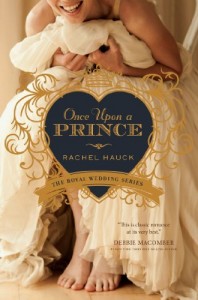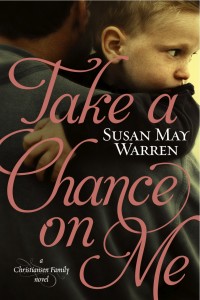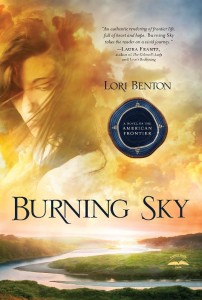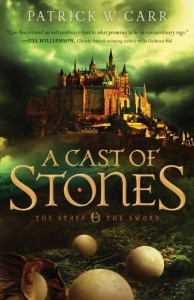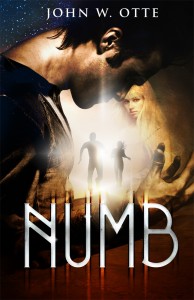Blog
Book Review: Born of Persuasion, by Jessica Dotta
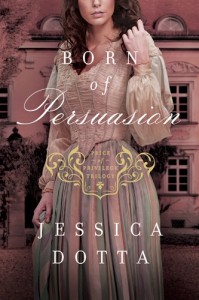 My copy of Born of Persuasion has a very interesting history. I ordered it before I left for the ACFW conference in Indianapolis last fall and read the first several chapters on the plane. I set it on the desk in my hotel room once I arrived, intending to read it on the way back. Unfortunately, in the jumble of books and clothing and all around madness of packing up to leave, one of my roommates packed it in her suitcase and took it home to Arkansas, where it waited until I realized I couldn’t find it and she realized that she had it. When she sent it back to me several months later, I was in the middle of a tight editing schedule and shoved it onto a shelf.
My copy of Born of Persuasion has a very interesting history. I ordered it before I left for the ACFW conference in Indianapolis last fall and read the first several chapters on the plane. I set it on the desk in my hotel room once I arrived, intending to read it on the way back. Unfortunately, in the jumble of books and clothing and all around madness of packing up to leave, one of my roommates packed it in her suitcase and took it home to Arkansas, where it waited until I realized I couldn’t find it and she realized that she had it. When she sent it back to me several months later, I was in the middle of a tight editing schedule and shoved it onto a shelf.
Fast forward another four months. I’m browsing Lifeway Books and come across the second book in Jessica Dotta’s series—the cover of which is just as gorgeous as the first—and wonder, “What did I do with the first book? I really liked that and I never finished.” Found it abandoned in my TBR bookshelf (read, floor to ceiling shelving in my living room), opened it, and didn’t put it down until I finished it. How did I not read this before? First of all, I should say that I’m not a Regency purist. I can take or leave Jane Austen. But I am a huge fan of Victorian literature, particularly the Gothic romance. Born of Persuasion is the perfect melding of Regency manners and restrictions with the creepy, dark, and mysterious. Let’s take a quick checklist of required elements:
- Young woman with dim prospects for marriage – CHECK
- Mysterious neglectful guardian – CHECK
- Creepy manor house – CHECK
- Brooding, attractive master of the house – CHECK, CHECK, AND CHECK AGAIN
And really, let’s face it, the character of Mr. Macy has charisma I can only liken to a black hole: no matter how hard you, the characters, and the story elements try to resist his pull, he drags everything in with the sheer force of his irresistible broodiness. Whether intentionally or unintentionally, he steals the show.
That, I think is why the story works so well. Normally, I’d be irritated by a protagonist who is this wishy-washy and constantly changes loyalty, but Dotta draws her plight with such realism and intensity, you almost can’t blame Julia for not knowing which end is up. I’m suspicious of everything in a Gothic novel, and even I didn’t know who to trust. Throw in Macy and his black hole personality, warping light and dark until you have no idea if he’s a hero or villain, and I can’t at all fault Julia for her bad decisions.
So, bottom line: if you love Gothic novels, if you clutch your battered copy of Jane Eyre to your chest on your twentieth reread, or you just want a good, engrossing tale, pick this one up. My copy of Mark of Distinction is on its way to me now, so I’ll be back with a review of that one soon.
About Born of Persuasion
The year is 1838, and seventeen-year-old Julia Elliston’s position has never been more fragile. Orphaned and unmarried in a time when women are legal property of their fathers, husbands, and guardians, she finds herself at the mercy of an anonymous guardian who plans to establish her as a servant in far-off Scotland. With two months to devise a better plan, Julia’s first choice to marry her childhood sweetheart is denied. But when a titled dowager offers to introduce Julia into society, a realm of possibilities opens. However, treachery and deception are as much a part of Victorian society as titles and decorum, and Julia quickly discovers her present is deeply entangled with her mother’s mysterious past. Before she knows what’s happening, Julia finds herself a pawn in a deadly game between two of the country’s most powerful men. With no laws to protect her, she must unravel the secrets on her own. But sometimes truth is elusive and knowledge is deadly.
Tags: Born of Persuasion, Gothic fiction, historical, Jessica Dotta, regency, romance
Five Best Productivity Tools
I know I’ve been busy when an entire week has passed without writing a blog post, and it hasn’t even crossed my mind. It’s not as if I’m busy right now (where’s that sarcasm font when you need it?): between family life with all of its end-of-the-school-year hecticness and work life (two books due to my publishers in five months, building a new website, the unexpected early “soft” launch of my first fantasy novel, and the beginning of promos for the new series), it’s hard to fit it all in. So I thought I’d do a blog post a la Michael Hyatt on the software tools that I can’t live without. These are the ones that keep me from getting any further behind than I already am and help streamline my everyday tasks more efficiently.
1) Scrivener I’ve seen more and more authors jump on the Scrivener bandwagon lately, and for good reason. It’s a convenient all-in-one writing solution, with places to store notes and manuscript versions, and much more than I have managed to figure out in the last eighteen months. I finally broke down and bought the Scrivener for Dummies book, though I didn’t realize it’s geared towards Mac and so not every lesson is directly applicable to my Windows version. I recently even started using Scrivener to write my blog posts. The plain text format lets me easily paste it into WordPress without any formatting glitches like sometimes happens with Word, and I have a copy of every post in one simple file.
Best feature: Automatic back-up. Not only can you set Scrivener to save your current file anytime you stop typing for more than a certain period of time (I have it set on the default two seconds), you can also designate a location for automatic back-up when you close the program. I have the filepath set to Dropbox, so I know even if I have a catastrophic hard drive failure, I have the last ten versions of my Scrivener workspace saved in the cloud and on every other electronic device. You can’t buy that kind of peace of mind.
2) Evernote I’m new to Evernote. I was using Microsoft One Note for a while, but its web clipping capabilities are rudimentary, and that’s the one function that I use most often. I have notebooks and stacks for almost everything: conference details, book research, articles to read later. I’ve even begun using it to organize my receipts. Since I have a habit of losing or misfiling business receipts and have to scramble at tax time, I now take a photo of the receipt immediately and file/tag it in Evernote. At the end of the year, I’ll have a quick visual representation of all my expenses. Not to mention a comprehensive collection of every bit of research that I used to bookmark and have to return to later.
Best feature: Cross-platform support. I have Evernote on the web/my PC, my cell phone, and my tablet. No matter what device I’m using, my notes sync across devices so I always have them at hand.
3) Wunderlist I’ve tried a lot of list-taking apps… and I mean a lot. Wunderlist in my opinion is the best of the bunch. While a lot of people who use Evernote also use it for their task lists, I find the interface just jumbles up my brain too much to be useful. That’s where Wunderlist’s simple, attractive interface does the trick. It’s the closest I’ve found to actual paper-list-note-taking, with the added value of having cross-platform support on all my devices. I keep the web version pinned to my Firefox tabs so it’s always open when I’m working (I almost always have my browser open for ease of research).
Best feature: Multiple notifications of upcoming tasks— in browser, on mobile devices, and via email. It’s very hard for me to forget a task because of this (though I do sometimes choose to ignore them). If it had a snooze option for alarms, it would be the perfect productivity software.
4) Mozilla Thunderbird I used to be a die hard Outlook user, mostly because it was one of the few e-mail clients that handled my multiple accounts adequately and allowed me to choose my reply-from address, even the original message was sent to a different account. Then I switched computers and had no end of issues with the newest version, including trouble importing my old folders. There had to be a better way. Enter Mozilla Thunderbird, an open-source email client from the makers of the Firefox browser that seems purposely constructed to thumb its nose at Outlook. It does everything that Outlook does, just better. If you really like the integrated task list and calendar functions of Outlook, Thunderbird has third-party plug-ins that accomplish the same thing.
Best feature: Support for Yahoo! Mail, something that Outlook only allowed with the addition of a Yahoo premium service.
5) Password manager I’m not going to name the particular password manager software I use, but after the Heartbleed weakness was found in websites using Open SSL authentication, it was a must. I had to set new passwords for a dozen sites, and it became pretty impossible to remember them all. Now I can use stronger, secure passwords and not have to remember them all, as long as I recall my master password. There are different software options for all different budgets and levels of tech savvy, so do some research before choosing one. I’m not sure why I didn’t start using one sooner.
Best feature: Auto-fill for password forms. Because yes, I’m that lazy.
Your turn! What software, tools, and productivity assists can’t you live without? Tell me in the comments below.
Tags: Evernote, Mozilla, password vault, productivity, Scrivener, software, Thunderbird, Wunderlist
2014 Christy Awards Finalists Announced!
Looking for new reading material? The 2014 Christy Award finalists were announced yesterday, honoring the best of the best in Christian fiction. Okay, I’ll admit to feeling slightly smug over the fact that many of these wonderful authors have been recent guests on this blog, but I’m so pleased for everyone who was nominated. Be sure to click through the links for author interviews and reviews for many of these great books!
Contemporary
Every Waking Moment by Chris Fabry (Tyndale House Publishers)
The Prayer Box by Lisa Wingate (Tyndale House Publishers)
Stones for Bread by Christa Parrish (Thomas Nelson, Harper Collins Christian Publishing)
Contemporary Romance/Suspense
Dangerous Passage by Lisa Harris (Revell, a division of Baker Publishing Group)
Once Upon a Prince by Rachel Hauck (Zondervan, Harper Collins Christian Publishing)
Rosemary Cottage by Colleen Coble (Thomas Nelson, Harper Collins Christian Publishing)
Vanished by Irene Hannon (Revell, a division of Baker Publishing Group)
Contemporary Series
Firefly Island by Lisa Wingate (Bethany House Publishers, a division of Baker Publishing Group)
Lock, Stock, and Over a Barrel by Melody Carlson (B&H Publishing Group)
Take a Chance on Me by Susan May Warren (Tyndale House Publishers)
Historical
All for a Story by Allison Pittman (Tyndale House Publishers)
Burning Sky by Lori Benton (WaterBrook MultnomahPublishing Group)
Sweet Mercy by Ann Tatlock (Bethany House Publishers, a division of Baker Publishing Group)
Historical Romance
Harvest of Gold by Tessa Afshar (River North, from Moody Publishing)
Stealing the Preacher by Karen Witemeyer (Bethany House Publishers, a division of Baker Publishing Group)
Under a Blackberry Moon by Serena B. Miller (Revell, a division of Baker Publishing Group)
Suspense
Dark Justice by Brandilyn Collins (B&H Publishing Group)
Outlaw by Ted Dekker (FaithWords, a division of Hachette Book Group)
Singularity by Steven James (Revell, a division of Baker Publishing Group)
First Novel
Burning Sky by Lori Benton (WaterBrook Multnomah Publishing Group)
A Cast of Stones by Patrick W. Carr (Bethany House Publishers, a division of Baker Publishing Group)
Dear Mr. Knightley by Katherine Reay (Thomas Nelson, Harper Collins Christian Publishing)
Visionary
A Cast of Stones by Patrick W. Carr (Bethany House Publishers, a division of Baker Publishing Group)
Dragonwitch by Anne Elisabeth Stengl (Bethany House Publishers, a division of Baker Publishing Group)
Numb by John W. Otte (Marcher Lord Press)
Tags: 2014 Christy Award finalists, Afshar, authors, Benton, Carlson, Carr, Christian fiction, Coble, Collins, Dekker, Fabry, Hannon, Harris, Hauck, James, Miller, Otte, Parrish, Pittman, Reay, Stengl, Tatlock, Warren, Wingate, Witemeyer
Breaking the (Writing) Rules
You know the saying: Rules are made to be broken. And if you’ve been around the writing business for more than fifteen minutes, you probably have a whole host of them in your head. What you may not know is that the rules are far less cut and dried than you might think.
Don’t get me wrong. Rules are important. The English language is based on rules. If everyone slapped together words into a sentence according to their own whims, communication would be near impossible. The subject/verb/object structure is the simplest method of constructing a sentence, but it certainly isn’t the only one. If we were restricted to only this one way of writing a sentence, works of literature would clunk along like a steam locomotive: they would eventually get where they was going, but the process would be slow-going and not always comfortable.
That said, I don’t claim to have all the answers. (You should suspect anyone who does.) There are as many opinions on this subject as there are writers, editors, and agents. I’m currently writing my fifth contracted book (only two of which are out), but in the course of working with excellent editors, I’ve found that the following rules can and should be bent or broken.
1) Show, don’t tell.
The is the first rule of writing that is taught to most beginners. It’s an important one, too. In numerous contests I’ve judged, you can tell new writers by sentences like this: His words shocked her. True, it conveys the idea, but it’s not very interesting. And a 90,000 word manuscript filled with “telling” like this gets old quickly. Contrast with a sentence like: His words slammed into her with the force of a tidal wave.
But, sometimes, telling is the only way to move a story forward, especially if your book covers a long amount of time. In my fantasy novels, I often need to use scene direction like, Spring moved into summer without further communication, and she had to concede that he was probably gone. (No, I didn’t actually use that line.) Can you imagine if I had to describe an entire season in which nothing interesting happened? Not only would the book be 300,000 words by the time it was done, but the reader would be asleep before I even got through April.
Rule of Thumb: Show when the scene is pivotal to character development or plot. Summarize when you need to transition quickly between scenes, seasons, or recap back story. Just keep it to a minimum.
2) Use unique metaphors.
As writers, we can get so sensitive to the idea of using cliches that we can swing too far the other way. I once read a book in which the hero was a mechanic, and he thought exclusively in tool, car, and oil metaphors. It was cute the first few times, but by the time I got to the midpoint of the book, I’d begun to hate him a little bit. The more unusual the metaphor, word, or thought, the fewer times you can use it without it drawing notice to itself.
The mark of a skilled writer is knowing when to choose between the unique and the commonplace. It’s perfectly okay to use simple constructions like “She smiled” or “He winked.” When you’re trying to move a scene forward, you don’t want to use something so unusual that the reader gets hung up on the words
Rule of Thumb: Use your unique turns of phrase when they won’t draw the reader out of the action, often as an opening or closing image to a scene. Go for the simplest and most concise way to express an idea that is not a cliche.
3) Write a book this way, because that’s how it’s always been done in this market.
I’m a firm believer in knowing your market and knowing the conventions and expectations of the genre. If you’re writing an inspirational romance, you won’t sell it if your character is dropping curse words every other page. If you’re writing a sweet romance, it probably won’t find a publisher if the heroic couple don’t get their Happily Ever After.
That said, “That’s how it’s always done” can hamper some great writing and unique ideas. Just because a CBA novel has never had a bounty hunter heroine (I don’t actually know this is the case… there probably has been a bounty hunter heroine) doesn’t mean that you can’t write one. The trick is writing something unusual within the confines of what is expected by your market or genre. Characters rarely drink in CBA fiction, but when I set out to write an authentic story set in Scotland, it felt disingenuous to eliminate all alcohol in a country with such a strong pub culture. I worked around it by keeping my characters from any semblance of drunkenness (which really didn’t fit with their characters anyway). Some readers still objected, but that was a calculated risk based on what I knew about my core audience, and reviews have reflected that it was a good risk.
Rule of Thumb: If you’re going to push boundaries, pick one area and stick with it. Readers (and editors) will forgive some minor deviations from “the way it’s done” if it’s done naturally and skillfully. But throw too many unexpected elements into the mix, and reviewers will cry foul.
Bottom line: rules give us a structure around which we craft our story. Think of it as a framework and not a straight jacket, understand how and why you are breaking the rules, and make your fiction a unique representation of your authorial point of view.
Just for fun, check out Kurt Vonnegut’s 8 Basics of Creative Writing.
Now it’s your turn. What rules do you think are made to be broken and why?
Tags: breaking writing rules, show don't tell, writing rules


